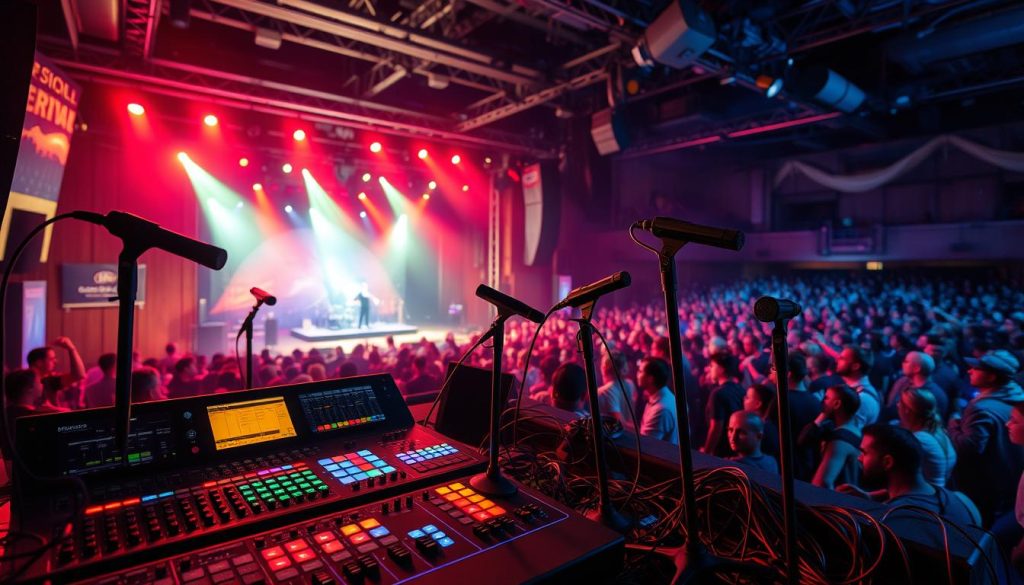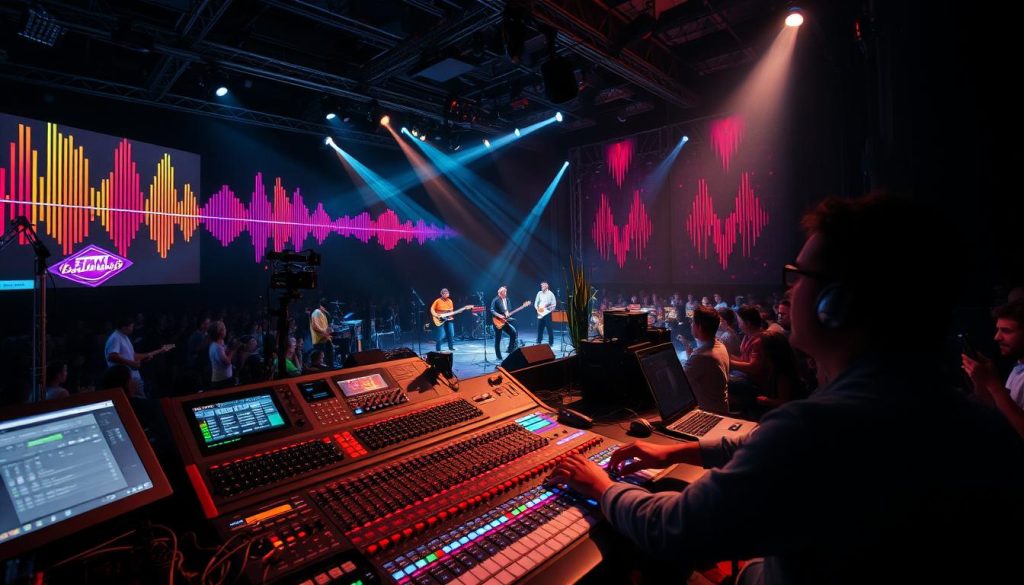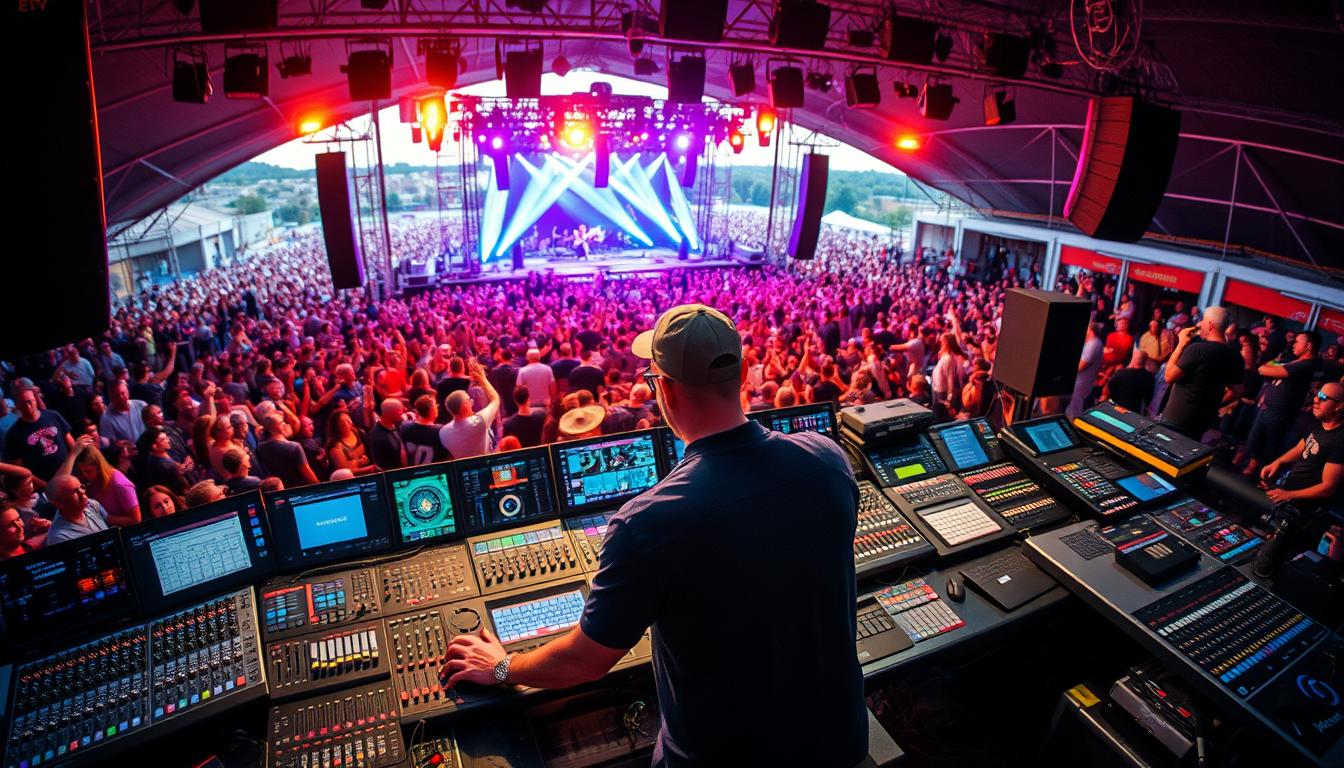I’ve always been drawn to the art of live sound engineering. It’s about changing sound in real-time during a show. The live sound mix engineer is key. They work with the artists, check the sound, and adjust it during the show.
Their aim is to make sure the sound is balanced and clear for the audience. This skill needs a deep knowledge of live sound engineering.
This article will explore live sound engineering deeply. We’ll look at the live sound mix engineer’s role, what makes a good live mix, and tips for mastering the stage mix. It’s for sound engineers and music lovers alike. You’ll learn a lot about the art of live sound engineering.
What is Live Sound Engineering?
Live sound engineering mixes and controls different sounds like vocals and instruments during live shows. I, as a live sound mix engineer, make sure the audience hears everything clearly. It’s my job to balance the sounds so everyone can enjoy the performance.
Understanding the Role of a Live Sound Mix Engineer
Before the show, I talk with the band to plan the sound. We work on setting the right volume and sound balance. During the show, I adjust the sound in real-time to make it the best for everyone.
My job includes:
- Mixing and balancing sounds from microphones, instruments, and effects for a great live mix
- Changing volume and sound settings to keep the music clear and strong
- Talking with the performers to get their feedback and adjust the sound
- Fixing any technical problems that happen during the show
- Working with the lighting and stage crew for a smooth show
With my skills in live audio mixing, I help bring the performers’ dreams to life. I make sure the audience has an amazing time.
The Roles of a Live Sound Engineer

In live music shows, the live sound engineer’s skills are key to success. They make sure everyone, both on stage and in the audience, hears great sound. There are two main jobs: Front of House (FOH) engineer and monitor mix engineer.
Front of House (FOH) Engineer
The FOH engineer sits in the audience area. They control the sound everyone hears. They make sure the sound is balanced and clear. They adjust levels, EQ, and effects for each sound to make the music come alive.
Their work greatly affects how the audience sees the show. A great FOH engineer can change the whole experience.
Monitor Mix Engineer
The monitor mix engineer is on stage’s side. They focus on the performers’ sound. They mix the sound so each musician can hear themselves clearly, through monitors.
They need to quickly adjust the mix to keep the performers in tune with the music. This helps everyone stay in sync.
In small venues, one engineer might do both FOH and monitor mixing. But in big shows, they split the work. This way, everyone gets the best sound possible.
| Live Sound Engineer Roles | Responsibilities |
|---|---|
| Front of House (FOH) Engineer | Controls the overall sound heard by the audience through the venue’s main speakers, ensuring a balanced and clear mix. |
| Monitor Mix Engineer | Creates customized monitor mixes for each performer, allowing them to hear their own instruments and vocals clearly on stage. |
live sound engineering: Key Components
Creating a great live sound mix needs a deep knowledge of key parts. At the center are the complex ways of audio signal flow and the fine art of gain staging. These are vital for live sound engineers to know.
Unraveling Audio Signal Flow
The audio signal flow is how sound moves from its source to the final output. It combines digital and analog gear, each crucial for the sound quality. Knowing about signal flow helps engineers fix problems fast, keeping the sound clear and consistent.
The Art of Gain Staging
Gain staging is about setting the right levels for each piece of equipment. It makes sure the sound is just right, avoiding feedback and distortion. By keeping gain levels perfect, engineers can give the audience a great live sound experience.
Learning about audio signal flow and gain staging gives live sound engineers the skills to handle live shows. They can make a sound that grabs the audience and leaves a lasting impression.
Balancing the Live Mix

As a live sound engineer, making a well-balanced live mix is key. I use tools like equalization (EQ), filters, and effects to shape sounds. This makes the music sound good together for the audience.
Getting the right sound is important. I focus on adjusting gain levels and fader positions. This makes sure every performer sounds great and the audience enjoys the show.
To get the sound right, I use many sound mixing tricks, including:
- Careful gain staging: I set input levels right to avoid distortion and make the sound clear.
- Live audio balancing: I adjust volumes of each sound to make the mix sound good together.
- Strategic EQ application: I use the equalizer to fix sound issues and make things clearer.
- Effective use of compression and limiting: I control loud sounds to make the mix smooth.
- Thoughtful application of reverb and delay: I add depth to the sound without making it too much.
By using these live mix techniques, I make sure the live show is amazing. It highlights the performers’ talents and pulls the audience into the music.
Live Sound Monitoring and Adaptability
As a live audio engineer, I’ve learned that adapting quickly is key. Live sound mixing changes fast, often without me touching the controls. It’s important to keep an ear on the sound and adjust fast to keep the mix clear.
Live audio engineers must listen closely and act fast. We need to fix problems and meet the needs of the performers and the audience. This means being ready for anything, from feedback to sudden changes in sound levels.
Being adaptable is crucial in live sound monitoring. We must stay alert and ready to adjust the mix. The challenges in live mixing are always changing. But with the right skills, we can overcome them and give a memorable live sound experience.
In live sound, adapting to changes is key. By keeping an eye on the mix and being ready to adjust, we make sure the show sounds great. This skill helps us handle any surprises that come our way.
Pro Tips for Mastering the Stage Mix
As a live sound engineer, I’ve learned a lot. Mastering live mixing is all about mixing technical skills with real-world experience. A key tip is to make sure the signal-to-noise ratio is good before adjusting the mix. This makes the mix clear and clean.
It’s also important to check the signal chain from start to end. Make sure everything works right. Labeling cables and faders helps keep things organized, especially in the chaos of a live show.
When mixing, start with a basic balance and listen closely. Adjust levels and EQ as needed. Getting feedback from different people in the venue helps make the mix better. A final tip is to use EQ cuts more than boosts for a cleaner sound. Make sure the main performer stands out.

